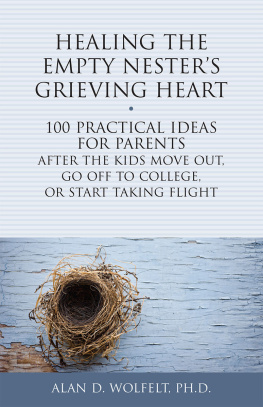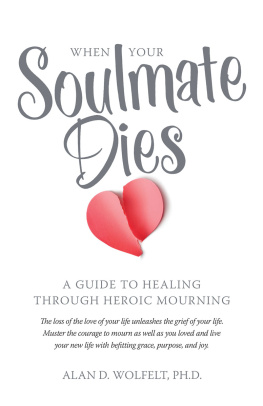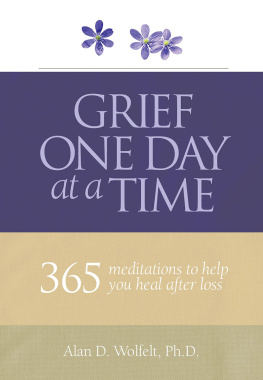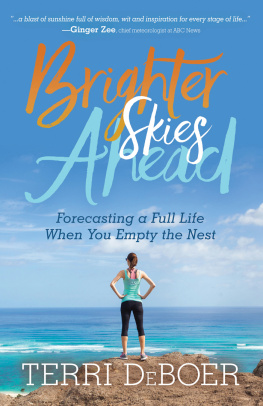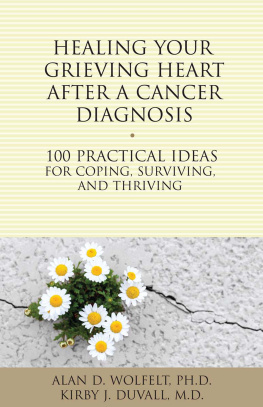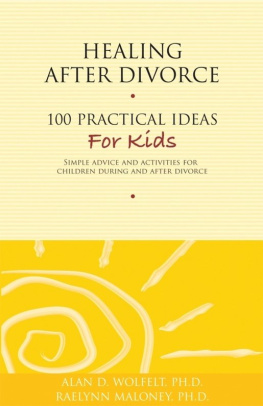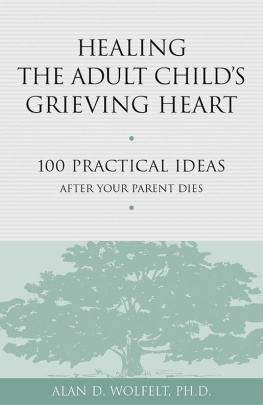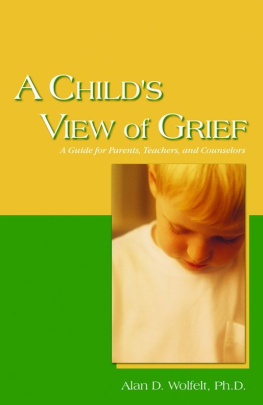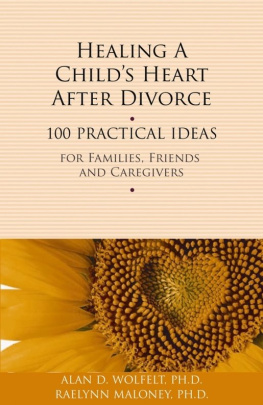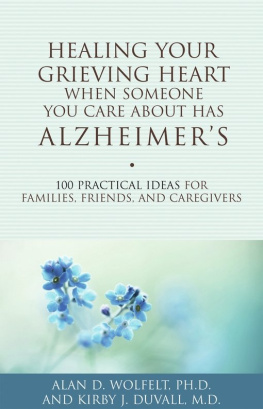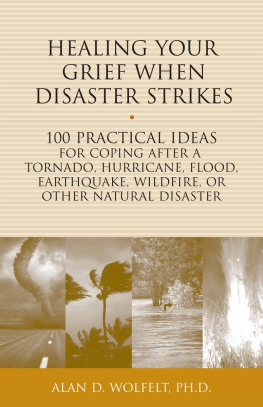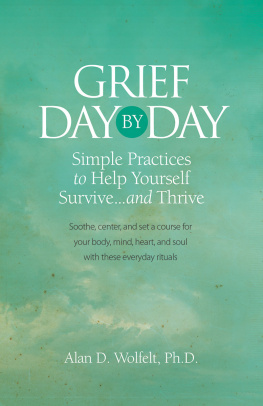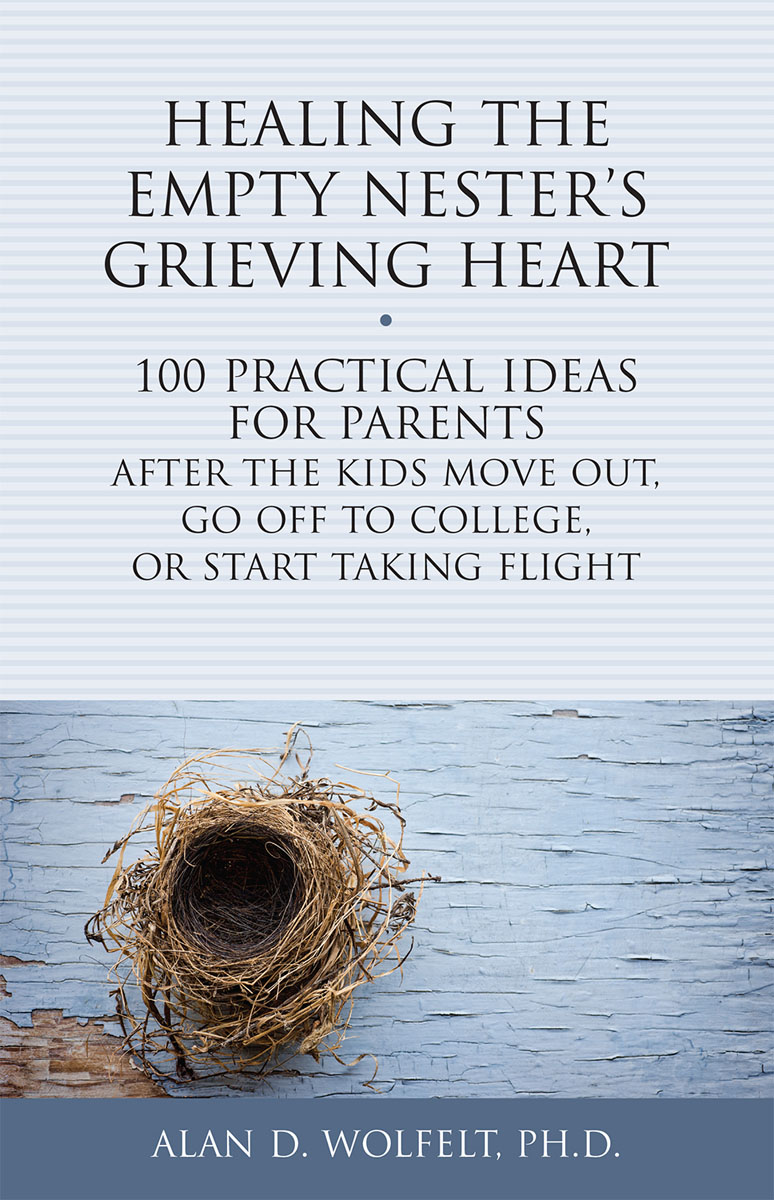

Also by Dr. Alan Wolfelt
Grief One Day at a Time: 365 Meditations to Help You Heal After Loss
Healing the Adult Childs Grieving Heart: 100 Practical Ideas After Your Parent Dies
Healing the Adult Siblings Grieving Heart: 100 Practical Ideas After Your Brother or Sister Dies
Healing Your Grief About Aging: 100 Practical Ideas on Growing Older with Confidence, Meaning, and Grace
The Mourners Book of Hope: 30 Days of Inspiration
Understanding Your Grief: Ten Essential Touchstones for Finding Hope and Healing Your Heart
When Your Pet Dies: A Guide to Mourning, Remembering, and Healing
The Wilderness of Grief: Finding Your Way
Companion Press is dedicated to the education and support of both the bereaved and bereavement caregivers. We believe that those who companion the bereaved by walking with them as they journey in grief have a wondrous opportunity: to help others embrace and grow through griefand to lead fuller, more deeply-lived lives themselves because of this important ministry.

For a complete catalog and ordering information, write or call:
Companion Press
The Center for Loss and Life Transition
3735 Broken Bow Road
Fort Collins, CO 80526
(970) 226-6050
www.centerforloss.com
2017 by Alan D. Wolfelt, Ph.D.
All rights reserved. No part of this publication may be reproduced, stored in a retrieval system, or transmitted in any form or by any means, electronic, mechanical, photocopying, recording, or otherwise, without the prior permission of the publisher.
Companion Press is an imprint of the
Center for Loss and Life Transition
3735 Broken Bow Road
Fort Collins, Colorado 80526
www.centerforloss.com
26 25 24 23 22 21 20 19 18 17 5 4 3 2 1
ISBN: 978-1-617222-50-4
For my precious childrenMegan, Chris, and Jaimie.
Thank you for allowing me the honor of being your parent. I hope you know your mom and I will never stop adoring you. Now, go out there into the world and enjoy the journey.
Love, Dad
C ONTENTS
INTRODUCTION
It can be so hard when our babies leave home. Its hard for us as parents, and its often hard for our children, tooeven if theyre technically no longer children but instead young adults.
As our sons and daughters begin the process of moving out, heading off to college, or just generally asserting their independence, mothers and fathers often experience a mixture of difficult feelings. At one time or another, we might feel numbness, confusion, anxiety, sadness, hopelessness, anger, and/or regret. Its also common for us to feel some degree of relief and release as part of the mix.
But why are we having all these crazy, painful feelings? What are we supposed to do with them? And how can we move forward and re-infuse our own lives with renewed purpose and meaning?
I wrote this book to help all of us empty-nester parents explore and find answers to these questions. I have a particular interest in this topic because not only are my wife, Sue, and I parents to three young adultsJaimie, Chris, and Megan, aged 21 to 28 at the time of this writingIm a grief counselor who travels the world educating people about the normal and necessary processes of grief and mourning. And even though Im what others think of as an expert on grief and mourning, and despite the fact that I knew what to expect when I brought my first child to college 1,000 miles away, I still felt knocked flat by the force of my feelings of ambivalence and loss.
This book affirms that empty-nester grief is normal and necessary. It will help you not only weather the transition years but also strengthen your relationships with your partner and children, rediscover your own divine spark, and live fully and joyfully the rest of your days. Those are big promises. Wed better get started.
The empty nester
The phrase empty-nest syndrome was coined in the 1970s to describe the phase in our lives when our children begin leaving home. While people have been giving birth to children for millennia, of course, the modern-day practice of children routinely leaving home and moving awayoften a great distance awayfrom their parents is a relatively new phenomenon. Not many decades ago, it was common for families to continue to live together, if not in the same house then at least in the same neighborhood or town. In fact, several generations often lived together under one roof.
Whats more, life expectancies were somewhat shorter in past generations. Im sure that my great-great-grandparents, too, experienced feelings of loss when their children took flight, but they and their peers could not always expect to live for three or four more decades beyond their active parenting years, as we are fortunate to.
Concurrent with the extension of life expectancies, parenting itself changed a great deal. The same advances that helped us live longer created opportunities for us to spend more and more resources on family and leisure activities. Just a few generations ago, most parents spent all their time working to provide their families with food and shelter. Today we devote ourselves to parenting. We focus a great deal of our time, energy, money, and emotionality on our children. In doing so, we create more interdependent bonds than were common in past generations.
Whats more, children used to become fully independent adults both at a younger age and more decisively. Todays twenty-somethings tend to hold onto their childhoods longer, creating a more extended and potentially more nebulous and challenging period of transition. Instead of fully claiming their independence, they often meander in and out of their parents shelter and support for years. Just when you have them through college and think theyre on their way, you find them perched back on the edge of your nest, looking out with trepidation or even laxity. Fly! you say. Its rough out there, they say. I think Ill go get a Starbucks.
Im not saying that children and parents used to love each other less; Im just pointing out that parent-child relationships were necessarily different in days gone by. The current-day form of the relationships were fortunate to share with our offspring likely makes the transition to empty nesthood more difficult for both parties. I guess were setting the stage for our children, who will probably draw on our modeling when it comes their turn to empty nest. Thats a thought that inspires me to dig deep and model well.
The grief of transition
About 30 years ago I founded an organization called the Center for Loss and Life Transition. Even back then, fresh out of my Ph.D. program and a few years before my wife and I would have children, I understood that death is not the only loss that causes feelings of grief. All significant life transitions do.
You see, whenever we love someone or something, or whenever we feel a strong attachment to someone or something, we suffer feelings of grief when the attachment is disturbed. Death is the most extreme instance of this, of course, and most of us know firsthand about the grief caused by death. But all kinds of disturbances engender grief. For example, if we love a house that we have lived in for many years, we will experience pangs of grief when it comes time to move to a different house. If we divorce or retire from a longtime career, we grieve. Even when we move through ostensibly happy rites of passage, such as milestone birthdays or major wedding anniversaries, we not only celebrate, we also grieve what we are leaving behind.
Next page
